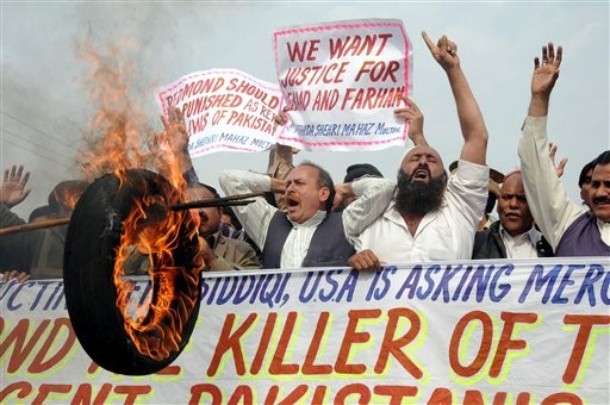
For more than a year and a half supporters of the war in Afghanistan have steadily peddled the argument that one of the reasons that the US must stay militarily engaged in the region (and especially in Afghanistan) is to support Pakistan, particularly in its fight against radical extremists. The Obama Administration has even hailed a new strategic partnership with Islamabad.
But the latest twist in the Raymond Davis saga should throw some mighty cold water on that notion.
For those who haven’t followed the Davis story closely he is a US diplomat who was arrested several weeks ago for shooting two Pakistanis, allegedly in self-defense. Here’s the problem, Davis is a member of the US embassy’s technical and administrative staff, which means that he has fairly absolute diplomatic immunity and should be released from prison.
Yet, this hasn’t stopped Pakistan from charging Davis with murder and detaining him and just yesterday the provincial court that has jurisdiction over the case has said it will be holding Davis for another three weeks until the issue of his immunity is resolved.
Let’s put aside for a second that this case seems to represent a fairly clear cut violation of international law. Pakistan is one of America’s largest foreign aid recipients and one of our supposedly most important allies in the region; just this week the Chairman of the Senate Foreign Relations Committee John Kerry traveled to Islamabad to try and resolve the issue – and was rebuffed; and the Obama Administration has steadily escalated the issue even threatening a downgrade in US-Pakistan relations in order to resolve the dispute.
Yet, Pakistan still refuses to release Davis. Indeed the announcement, even after Kerry’s visit, that the matter will need another three weeks of consideration is a huge diplomatic slap in the face to the United States and especially this Administration.
Now I understand that the Pakistan government has some issues with anti-US attitudes in the country (clearly through some fault of their own) . . . and I know that Pakistan allows NATO supply trucks to transit the country and it allows US military drones to attack suspected al Qaeda terrorists (as well as those Pakistan Taliban groups that threaten the Pakistani state). But shall we catalog for a moment all the ways in which Pakistan is not just a lousy ally, but is actually undermining US interests.
1) Is home to Osama bin Laden and other top al Qaeda lieutenants (and has been for 9 years) and has made little effort to deal with the issue.
2) Is home to terrorist training camps like one where the Times Square bomber was trained – and also has made little effort to deal with that issue.
3) Is actively supporting an insurgent group in Afghanistan that is killing US soldiers on a regular basis.
4) Provides safe haven to that same insurgency and even after repeated US demands/requests/inducements has offered no indication they are willing end its support for these groups.
5) Has created a diplomatic incident with the United States over the arrest of a protected US diplomat.
Does this sound like the behavior of a country that is interested in a strategic partnership with the United States?
Now granted I understand that it can be a long and drawn-out process of improving relations, but after 9 years shouldn’t it be obvious that the United States has made virtually no progress in turning Pakistan into a true strategic ally of the United States. If Islamabad feels little compunction about openly violating international law and US diplomatic demands does anyone really believe they will suddenly turn around and be of assistance against the Taliban or even jihadist groups that threaten America?
Pakistan will support the US only insofar as it bolsters Pakistani national interests – and as we’ve seen repeatedly the Pakistan government is either too weak to be a strategic partner of the US or is simply not interested. Or even worse, they understand that no matter what they do; no matter how many sharp sticks they put in the eye of the United States there will be little to no consequences because we need Pakistan a lot more than they need us. How many more pieces of evidence do we need before it becomes abundantly clear that Pakistan is not interested in doing anything to help the US that would even slighly undermine Pakistan’s own interests?
If the Davis incident shows us anything it is a reminder of how little leverage we have with Pakistan, what little ability we have to shape Pakistan’s behavior and how tenuous US-Pakistani relations remain. At what point will US policymakers wake up to that reality and respond accordingly?
Michael A. Cohen is a Senior Fellow at the American Security Project and the author of Live From the Campaign Trail: The Greatest Presidential Campaign Speeches of the 20th Century and How They Shaped Modern America (Walker Books: 2008). This article originally appeared on democracyarsenal.org.
Image: pakistanprotestdavis.jpg
